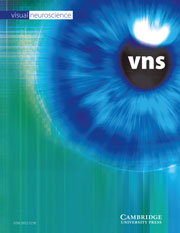Article contents
Chromatic input to cells of the magnocellular pathway: Mean chromaticity and the relative phase of modulated lights
Published online by Cambridge University Press: 10 March 2010
Abstract
If the relative phase of red and green modulated lights is changed, at low temporal frequencies the response of cells of the magnocellular (MC) pathway has been found to be minimal not to counterphase, chromatic modulation (as expected of a luminance mechanism) but shifted to some phase intermediate between luminance and chromatic modulation. The results could only be modeled by assuming interaction between achromatic and chromatic inputs to MC cells. The ‘phase shift’ resembled that seen with psychophysical threshold measurements using the same stimuli. Psychophysical results also showed that the phase shift is dependent on the chromaticity of a background. The results reported here show that the direction of the phase shift in MC cells is reversed by changing the background from long to short wavelengths and is consistent with psychophysical observations. Cell behavior was again modeled by assuming vector summation of achromatic and chromatic inputs. The reversal of phase-shift direction requires a reversal in polarity of the chromatic input. The underlying physiological mechanism may involve summation of chromatic signals of opposite polarity; if the relative size of these signals depends on the background, this may determine the direction of phase shift.
- Type
- Research Article
- Information
- Copyright
- © 2004 Cambridge University Press
- 3
- Cited by


